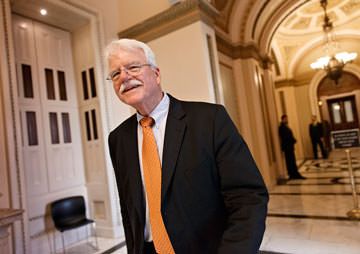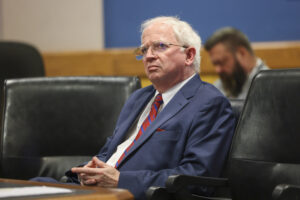The Toughest Liberal in the House Is Retiring, Worries About ‘Dark Money’
Rep. George Miller, D-Calif., hails from a time when liberals didn't apologize for trying to make the country fairer and notes that he won his first race on the basis of only two promises: "to end the Vietnam War and to enact single-payer health care." AP/J. Scott Applewhite
AP/J. Scott Applewhite
AP/J. Scott Applewhite
Can you be a tough liberal who also knows how to work with the other side? Can you be unwavering in trying to lift the wages of the low-paid, bring health coverage to the uninsured, equalize educational opportunities and protect the environment — and still compromise enough to get all these things done?
These words could be about the late Edward M. Kennedy. But they also describe Rep. George Miller, D-Calif., who announced his retirement this week. If the House has a Ted Kennedy, he’s it.
Characteristically, Miller did not signal his impending departure with some whining, nostalgic proclamation pining for a lost Golden Age of civility. He loves a lively legislative scrap and is in a robustly good mood about the long-term possibilities of progressive politics. Congress, he insists, could still get around to increasing the minimum wage, extending unemployment benefits, reforming immigration and expanding pre-kindergarten programs. And far from running away from the Affordable Care Act, Miller sees it as one of the crowning achievements of his time in Congress.
Miller, 68, was first elected to Congress in 1974 as part of the reformist Democratic class swept in by a reaction to Richard Nixon’s scandals. He’s one of only two continuously serving “Watergate babies” left in the House, though this 6-foot-3 bear of a man laughs that this is “not my preferred title.”
Miller hails from a time when liberals didn’t apologize for trying to make the country fairer and notes that he won his first race on the basis of only two promises: “to end the Vietnam War and to enact single-payer health care.” He thus sees Obamacare as a giant step, “the biggest gift to economic security for families since Social Security.”
But if Miller does not whine, he’s a realist about how much has changed during his four decades in Congress. He reveres Kennedy and worked closely with him, along with Rep. John Boehner, former Republican Sen. Judd Gregg and President George W. Bush, to pass the No Child Left Behind Act. Yet Miller observed that if Kennedy came back to life, he “would have a hard time recognizing this legislative process.”
Like Kennedy, Miller is an unabashed champion of the labor movement. “You can chart the decline of the wage base and middle-class family incomes with the decline of unions,” he told me on Wednesday. “It doesn’t mean the unions were always right, but it does mean they were very effective on behalf of the middle class.”
Yet he and Kennedy helped craft an education bill not entirely to the teachers unions’ liking because they saw a liberal principle at stake in the need to raise the performance of low-income and minority children. Two liberals and a group of conservatives could agree on this: “Let’s find out what we’re getting for the dollars we’re spending.”
Miller offers an astringent analysis of what is keeping Republicans, including Boehner, now the House speaker, from engaging in this sort of give-and-take today. Above all, he highlights the role of “dark money” in politics — “and it really is dark.”
“Unlimited, anonymous money,” he says, is now regularly deployed from the right against any Republican with the nerve to sit down with Democrats. “There are forces in the Republican Party that won’t let you walk into the room.” Dark money threatens incumbents with primaries spearheaded by tea party activists increasingly uneasy with social and demographic changes in the country.
Abetting obstruction, he says, is the abuse of the filibuster in the Senate. This has turned Minority Leader Mitch McConnell into “the choreographer” of President Obama’s time in office as long delays on a few bills prevent action on others.
For all that, Miller is confident about the future because he sees conservatives as having to resort to voter suppression efforts and procedural shenanigans to block a strong national tide in favor of economic justice. Support for the minimum wage is high, he says, because so many Americans are tired of companies counting on government subsidies to the poor to make up for low pay.
As for those who challenge the effectiveness of pre-K programs, Miller provides a ready response: “Why is it that rich people struggle and fight and stand in line to get their children into the best early learning programs they can?” Why, indeed?
Congress could use more liberals who can brawl and negotiate at the same time. Perhaps Miller will now open a school for progressive legislators. He can name it after Ted Kennedy.
E.J. Dionne’s e-mail address is ejdionne(at)washpost.com.
© 2014, Washington Post Writers Group
Your support matters…Independent journalism is under threat and overshadowed by heavily funded mainstream media.
You can help level the playing field. Become a member.
Your tax-deductible contribution keeps us digging beneath the headlines to give you thought-provoking, investigative reporting and analysis that unearths what's really happening- without compromise.
Give today to support our courageous, independent journalists.






You need to be a supporter to comment.
There are currently no responses to this article.
Be the first to respond.